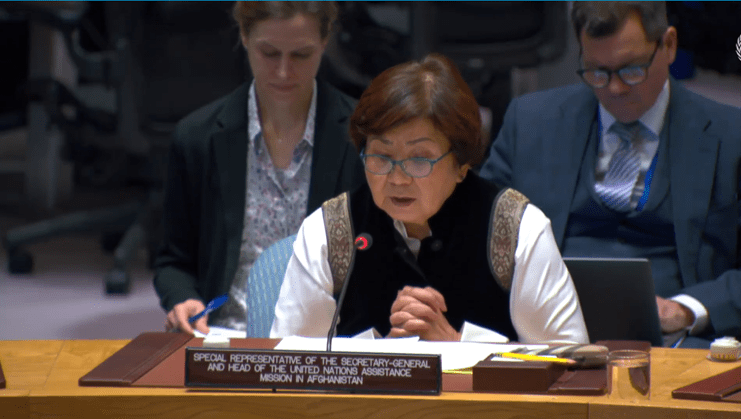ATLANTA (Pajhwok): The UN security general’s special representative, hailing improved security and counter narcotics in Afghanistan, insists interaction with the caretaker government does not mean legitimizstion.
In her briefing to the UN Security Council, UNAMA chief Roza Otunbayeva expressed her deep concern over the situation of human rights in Afghanistan.
She said Afghanistan was a signatory of the human rights declaration but the key features of the human rights situation in the country today were suppressed.
She said: “Afghanistan today has a record of systemic discrimination against women and girls, repression of political dissent and free speech…”
She also noted a lack of meaningful representation of minorities and ongoing instances of extrajudicial killing, arbitrary arrests and detentions, torture and ill-treatment.
The Shiite community remained at disproportionate risk of harm, she said. Pointing to attacks of Shiite worship places, Otunbayeva said the minority communities of Afghanistan were still at the risk of serious threats.
Over 20 million people of Afghanistan needed humanitarian assistance while the forced deportation of Afghan refugees from Pakistan made even worse the situation of the poor and needy.
Despite its contravention of current treaty obligations, the incumbent government called them internal issue of Afghanistan, Otunbayeva added.
The UNAMA chief emphasised on interaction with the caretaker government, arguing it did not mean recognition,. “Dialogue does not legitimise. It can be used “to express disapproval, yet encourage change.”
However, Otunbayeva hailed security and a marked decrease in the cultivation and production of narcotics in Afghanistan as positive actions of the caretaker government.
On the other hand, Pakistan’s representative Munir Akram said the caretaker government should lift restrictions on women’s rights and reconsider the curbs on the right to education of girls.
aw/mud







GET IN TOUCH
NEWSLETTER
SUGGEST A STORY
PAJHWOK MOBILE APP